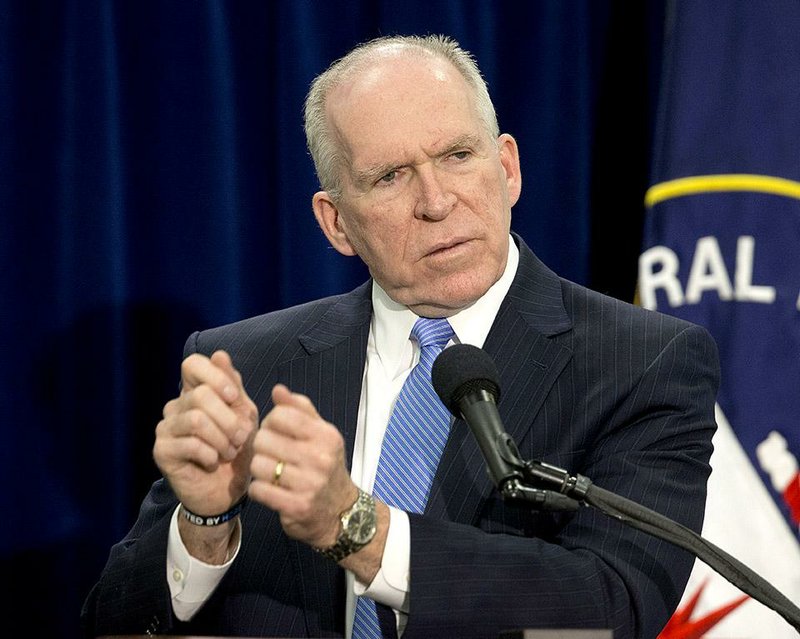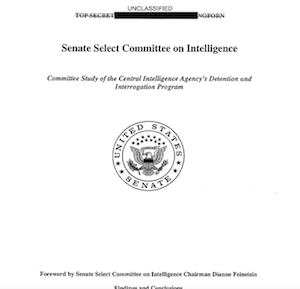WASHINGTON -- CIA Director John Brennan, responding to a Senate report on brutal CIA interrogation methods, acknowledged Thursday in a rare televised news conference that "abhorrent" tactics were used on terrorism suspects and said it was "unknown and unknowable" whether their treatment yielded crucial intelligence that couldn't have been gained in any other way.
Brennan began his public explanation recounting the horrors of the Sept. 11, 2001, terrorist attacks, his agency's determination to prevent more such assaults, and how CIA officers were the first to fight and early to die in the Afghanistan war. The CIA, he said, "did a lot of things right" in a time when there were "no easy answers."
Brennan criticized the Senate Intelligence Committee's investigation on multiple fronts, saying, for example, it was "lamentable" that the committee interviewed no CIA personnel to ask "what were you thinking" and "what was the calculus you used" in determining interrogation practices.
Without that, he said, "you lose the opportunity to really understand what was taking place at the time."
The intelligence committee's 500-page release concluded that the CIA inflicted suffering on al-Qaida prisoners beyond its legal authority and that none of the agency's "enhanced interrogations" provided crucial intelligence. It cited the CIA's own records, documenting in detail how waterboarding -- a form of simulated drowning -- and lesser-known techniques such as "rectal feeding" were employed.
Brennan said it cannot be proved one way or the other whether the interrogation methods provided critical, lifesaving intelligence. In that respect, he stopped short of the claims of other defenders of the program who said the tough methods saved thousands of American lives and provided the breakthrough in finding 9/11 mastermind Osama bin Laden.
Valuable information was obtained after the harsh interrogations, he said, including some on bin Laden. But he said it was impossible to know whether the detainees provided that information because of the "enhanced interrogation techniques." He said the cause-and-effect relationship is "unknown and unknowable."
Brennan refused to say whether he considered the techniques to be torture, declining to use the word in his 40 minutes of remarks and answers to questions.
"I will leave to others how they might want to label those activities," Brennan said.
As he spelled out his objections to the report, the office of Democratic Sen. Dianne Feinstein, head of the Senate intelligence committee, unleashed a barrage of Twitter posts challenging him. One said "every fact" in the committee's report was based on CIA records, cables or other evidence.
Brennan denied that the CIA intentionally misled lawmakers.
"We take exceptional pride in providing truth to power," he said pointedly, "whether that power agrees with what we say or not and regardless of political party."
"To be clear, there were instances where representations that the program -- about the program -- that were used or approved by agency officers were inaccurate, imprecise or fell short of our tradecraft standards," he said.
Asked if CIA leadership had been lied to by employees in the field, he said, "I cannot say with certainty whether or not individuals acted with complete honesty."
The Senate report doesn't urge prosecution for wrongdoing, and the Justice Department has said it has no interest in reopening a criminal probe. But on Wednesday, a United Nations special investigator demanded those responsible for "systematic crimes" be brought to justice, and human-rights groups pushed for the arrest of key CIA and Bush administration figures if they travel overseas.
Current and former CIA officials pushed back, painting the Senate report as a political stunt by Democrats.
It is a "one-sided study marred by errors of fact and interpretation -- essentially a poorly done and partisan attack on the agency that has done the most to protect America," former CIA Directors George Tenet, Porter Goss and Michael Hayden wrote in a Wall Street Journal opinion piece.
In a formal, 136-page rebuttal to the Senate report, the CIA suggested Democrats searched through millions of documents to pull out only the evidence backing up predetermined conclusions.
Tenet, the director on Sept. 11, 2001, said the interrogation program "saved thousands of Americans lives" while the country faced a "ticking time bomb every day."
Former Vice President Dick Cheney also pushed back, saying in a Fox News interview that the Senate report "is full of crap."
Cheney said the CIA's approach to interrogating terror suspects was necessary after the 9/11 attacks and that the people who carried them out were doing their duty.
President Barack Obama banned many of the harsh interrogation tactics upon taking office, calling the treatment "torture." But Obama has repeatedly said he has no interest in prosecuting those involved or revisiting how and why the decisions were made.
Bad example by U.S.
Elsewhere on Thursday, the United Nations special rapporteur on torture said the CIA's actions and the United States' reluctance to punish those responsible have set back efforts to fight torture worldwide.
Juan Mendez said that during his travels, many governments had cited the U.S. use of torture as justification for their own abuses.
"Many states either implicitly or explicitly tell you: 'Why look at us? If the U.S. tortures, why can't we do it?'" he said.
Mendez, who has been reporting on torture for the United Nations since 2010, commended the U.S. for publishing the Senate report and "fulfilling the obligations of the United States with respect to the truth." The Bush administration, he said, "aggressively and repeatedly rejected the principles of transparency and accountability and maintains the pattern of denial and defense."
But Mendez stressed that releasing the report was only the first step in fulfilling the United States' obligations under the U.N. Convention Against Torture, which requires the investigation and prosecution of those who were responsible for ordering, planning or implementing the CIA torture program.
"As a nation that has publicly affirmed its belief that respect for truth advances respect for the rule of law, and as a nation that frequently calls for transparency and accountability in other countries, the United States must rise to meet the standards it has set both for itself and for others," he said.
Two important U.S. NATO allies on Thursday also condemned the CIA treatment detailed in the report.
Turkish Foreign Minister Mevlut Cavusoglu, whose country is in a strategically critical location between Europe and the Middle East, said the report is being analyzed to determine whether any Turkish citizens were involved.
From what has already been read, however, "we see that there was inhumane and really unacceptable torture and treatment," he said.
The Russian Foreign Ministry's rights envoy, Konstantin Dolgov, said Thursday that the data in the report "contradict the U.S. aspirations to serve as a model of democracy."
Relishing an opportunity to turn the tables on the U.S. over its criticism of Moscow for human-rights abuses, Dolgov said the report proved "flagrant and systemic rights abuse." He pointed out that only an executive summary was released, and urged international organizations and rights groups to push for the release of full report and the prosecution of those involved in abuses.
Russia also called for an investigation into the role of other governments that allowed the CIA to operate secret prisons on their soil. Those governments appeared to be complicit in the "crimes" detailed in the report, Russia said.
In Ankara, Cavusoglu praised the release of the report, saying "transparency is important," but, he added "this doesn't legitimize the torture that was inflicted."
Speaking alongside Cavusoglu, Slovakian Foreign Minister Miroslav Lajcak said the use of illegal camps and "unacceptable methods of interrogation" detailed in the report had been known, but he welcomed the report's publication.
"I see it as a sign of the United States distancing themselves from these practices of the past," he said. "And it should also serve as a guarantee that things like that will never happen in the future."
French far-right leader Marine Le Pen, meantime, drew anger by saying on BFM television Wednesday that she "did not condemn" the CIA's methods.
"I believe that those people who are dealing with terrorists, and trying to get information out of them that helps save civilian lives, are responsible people," she said.
Le Pen, who wants to be president and whose National Front party has made big electoral gains this year, quickly backtracked, saying she meant authorities should use all means against terrorism "under the law, obviously not torture."
Information for this article was contributed by Ken Dilanian, Calvin Woodward, Nancy Benac, Bradley Klapper, David Rising, Ayse Wieting, Vladimir Isachenkov and Angela Charlton of The Associated Press; by David M. Herszenhorn, Nick Cumming-Bruce, Mark Mazetti and Matt Apuzzo of The New York Times; and by Steve Geimann and Chris Strohm of Bloomberg News.
A Section on 12/12/2014

